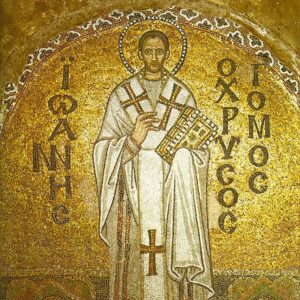 St. John Chrysostom was born in 347 and in his early years was well educated in oratory and law. He became a monk and, like many other holy men, damaged his health through excessive austerities as well as the unhealthy surroundings of his cave-hermitage. He spent long periods standing and did not have sufficient sleep while spending his time learning the Bible by heart! He also began to make his name as a preacher and commentator on the letters of St. Paul and the Gospels of St. Matthew and St. John. His love for the Scriptures was expressed in his many homilies; he emphasized how the Word could be applied to the problems of the age (whereas many of his contemporaries were far less practical). In this sense, much of his preaching and writings are still relevant to our own day. “Chrysostom” was a later acquired name which means “golden-mouthed.”
St. John Chrysostom was born in 347 and in his early years was well educated in oratory and law. He became a monk and, like many other holy men, damaged his health through excessive austerities as well as the unhealthy surroundings of his cave-hermitage. He spent long periods standing and did not have sufficient sleep while spending his time learning the Bible by heart! He also began to make his name as a preacher and commentator on the letters of St. Paul and the Gospels of St. Matthew and St. John. His love for the Scriptures was expressed in his many homilies; he emphasized how the Word could be applied to the problems of the age (whereas many of his contemporaries were far less practical). In this sense, much of his preaching and writings are still relevant to our own day. “Chrysostom” was a later acquired name which means “golden-mouthed.”
St. John never shied away from controversy. He worked tirelessly to reform the moral corruption of the imperial court and the clergy of his day. He called to task rich and poor alike for superstitious and immoral behavior. Calls for his banishment and exile were frequent. He was, in fact, exiled more than once and in the year 404 he was banished to Armenia and then to Pontus. St. John died in 407 in the on his way to his place of exile.
Among St. John’s writings, we find this: “Do you wish to honor the body of Christ? Do not ignore Him when He is naked. Do not pay Him homage in the temple clad in silk, only then to neglect Him outside where He is cold and ill-clad. He who said: ‘This is my body’ is the same who said: ‘You saw me hungry and you gave me no food,’ and ‘Whatever you did to the least of my brothers you did also to me’… What good is it if the Eucharistic table is overloaded with golden chalices when your brother is dying of hunger? Start by satisfying his hunger and then with what is left you may adorn the altar as well.”
Let us pray. “Lord God, give us the wisdom and the courage of St. John Chrysostom. Help us remain true to the Gospel and give us the grace we need to actually live that same Gospel. Through Christ the Lord. Amen.”
***
Cada 13 de septiembre celebramos la Fiesta de San Juan Crisóstomo (347-407), llamado así por su elocuencia al predicar, la belleza y profundidad de sus homilías, y la fuerza de sus escritos. “Crisóstomo” quiere decir “boca de oro” (yuxtaposición de dos términos griegos: chrysós, ‘oro’, y stoma, ‘boca’). Juan de Antioquía -como también se le conoce- fue obispo de Constantinopla. Es considerado uno de los cuatro grandes Padres de la Iglesia y uno de los más grandes oradores de todos los tiempos. Después de haber vivido como monje eremita en su casa y en el desierto, fue ordenado sacerdote y empezó a hacerse conocido por sus sermones.
Como obispo se deshizo de bienes superfluos de la Iglesia y con las riquezas obtenidas atendía las necesidades de los pobres. Le exigió a sacerdotes y monjes vestir con sencillez y comer con moderación. Se preocupó también por la formación catequética de los fieles. La firmeza de su actitud le causó roces e incomprensiones. Vivió sus últimos días en el destierro y murió el 14 de septiembre de 407. Quienes lo acompañaron en su agonía testificaron sus últimas palabras: “Sea dada gloria a Dios por todo.”
Oremos. “San Juan Crisóstomo, tú que fuiste sal de la tierra y luz del mundo, tú que difundiste con claridad las Enseñanzas, y con santa paciencia resististe en los infortunios defiéndenos a todos de la injusticia y el error, lleva nuestras suplicas a Dios Padre todopoderoso. Pídele también que nos ayude a amar al prójimo, que nos de la gracia de asumir el Evangelio como camino, regla, y vida en nuestro ser y actuar, y que nos bendiga con los dones y talentos necesarios para alcanzar la Gloria Celestial. Por Jesucristo nuestro Señor. Amén.”

